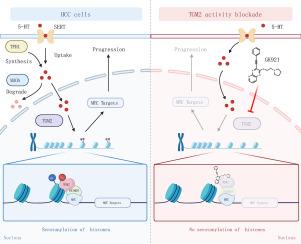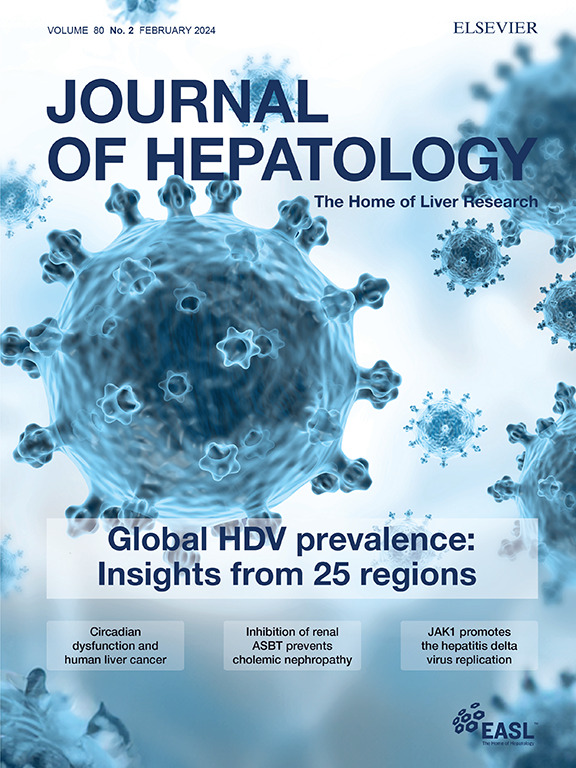TGM2-mediated histone serotonylation promotes HCC progression via MYC signalling pathway
IF 26.8
1区 医学
Q1 GASTROENTEROLOGY & HEPATOLOGY
引用次数: 0
Abstract
Background & Aims
Hepatocellular carcinoma (HCC) is an aggressive malignancy with few effective treatment options. H3Q5ser, a serotonin-based histone modification mediated by transglutaminase 2 (TGM2), affects diverse biological processes, such as neurodevelopment. The role of TGM2-mediated H3Q5ser in HCC progression remains unclear. This study investigated the role of TGM2 in promoting HCC progression and evaluated its potential as a therapeutic target for HCC treatment.Methods
Adeno-associated virus (AAV)-mediated liver-specific overexpression models of Tgm2 or H3.3 were adopted to validate the effects of H3Q5ser on HCC progression. CUT&Tag and RNA sequencing was employed to investigate the underlying mechanisms. HCC organoids, subcutaneous xenograft models, and hydrodynamic tail vein injection models were used to evaluate the treatment efficiency of TGM2 inhibitors.Results
TMG2 expression positively correlated with higher AFP levels, poor differentiation, and a later BCLC stage. Tgm2 deficiency or H3Q5ser inhibition notably inhibited HCC progression. CUT&Tag and RNA sequencing analyses revealed that downregulated genes were enriched in the MYC pathway following treatment with the TGM2 inhibitors. Furthermore, transcriptional intermediary factor 1 β mediated the recruitment of TGM2 to MYC, facilitating H3Q5ser modifications on MYC target genes. Finally, targeting the transglutaminase activity of TGM2 significantly suppressed HCC progression and showed synergy with sorafenib treatment in preclinical models. TGM2 inhibitors did not cause significant myelosuppression or tissue damage.Conclusions
TGM2 serves as a prognostic biomarker and targeting its transglutaminase activity may be an effective strategy for inhibiting HCC progression.

求助全文
约1分钟内获得全文
求助全文
来源期刊

Journal of Hepatology
医学-胃肠肝病学
CiteScore
46.10
自引率
4.30%
发文量
2325
审稿时长
30 days
期刊介绍:
The Journal of Hepatology is the official publication of the European Association for the Study of the Liver (EASL). It is dedicated to presenting clinical and basic research in the field of hepatology through original papers, reviews, case reports, and letters to the Editor. The Journal is published in English and may consider supplements that pass an editorial review.
 求助内容:
求助内容: 应助结果提醒方式:
应助结果提醒方式:


